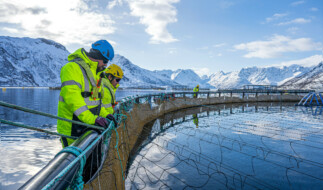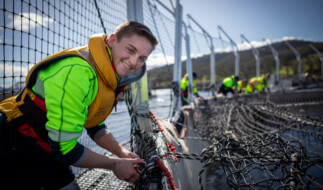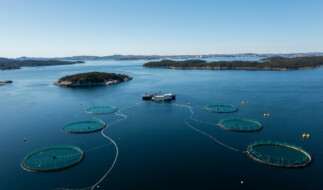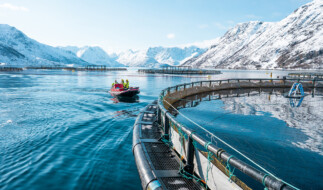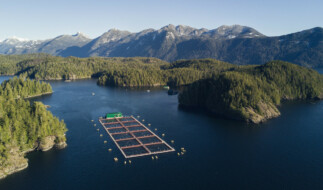Do you have questions about farmed salmon or salmon farming? Check out our most frequently asked questions (FAQs). If you can't find your answer, don't worry - please contact us.
- About farmed salmon
- Health & nutrition
- Environmental impact
- Salmon welfare
- Choosing responsibly sourced farmed salmon
- Global Salmon Initiative
I have more questions. How can I reach you?
Please contact us at GSIAdmin@globalsalmoninitiative.org. We'd love to hear from you!
About farmed salmon
Why do we need farmed salmon?
Nearly 90% of the world's marine fish stocks are now fully exploited, overexploited, or depleted. Farmed seafood provides half of all the fish we eat worldwide, and with a growing population and a change in consumption habits we know demand is going to continue to grow. If we took this many fish from wild fisheries we would deplete sea-life species and biodiversity that are important to ensuring a healthy ocean.
Fish farming, also known as aquaculture, reduces pressure on certain over stressed wild stocks and can help us meet demand for healthy, sustainable, and resilient foods.
Is farmed salmon more or less sustainable than other animal proteins?
By many measures farmed salmon is one of the most sustainable animal proteins available. A common way to measure environmental impact in the food producing sector is to gauge how efficiently an animal can turn its food into protein, or what the industry calls feed-conversion ratio. Farm-raised fish have one of the lowest feed-conversion ratios and farmed salmon on average need 1.1 to 1.5 pounds of feed to produce 1 pound of body mass.
In addition, farmed salmon have a low carbon footprint, use less freshwater, and use less land than land-based animal sectors.
For more information check out our page on how farmed salmon contributes to sustainable food systems.
What do farmed salmon eat?
Farmed salmon eat a highly specialized diet to obtain all the nutrients they need to thrive. These diets typically include a mix of protein, vitamins, and minerals and are rich in omega-3s which keep the fish healthy, and also support many health benefits we get from consuming salmon.
As responsible salmon farmers, we are always looking for ways to improve the sustainability of our feed ingredients to reduce our footprint and look for innovative ways to keep the fish healthy and nutritious.
Health & nutrition
Are farmed salmon as healthy as wild salmon?
Yes! Farmed salmon and wild salmon have been documented to offer the same overall nutritional value. Both are a good source of protein and essential nutrients and vitamins. Compared to wild salmon, farmed salmon contains more omega-3 fatty acids which are considered health protective fats.
Are farmed salmon dyed pink?
Both wild and farmed salmon get their coloring from what they eat - specifically from an antioxidant called astaxanthin. Astaxanthin is even sold as a health supplement for humans. In the wild, salmon get astaxanthin from the krill and crustaceans they eat. On the farms, astaxanthin is added to to the feed to replicate the wild salmon's diet. In either case, it's an essential component to maintain the salmon's health.
Why is 'color added' on some farmed salmon packaging?
Sometimes farmed salmon may contain a 'color-added' label, even though no dyes have been added. This is because some countries require labeling of any dietary supplements used that add color to a product, and in our case astaxanthin does add color. It’s important to remember astaxanthin is an important carotenoid and antioxidant which is highly nutritious for the salmon and an important component of their feed.
Should I be worried farmed salmon contains contaminants like mercury and PCBs and dioxins?
No. Farmed salmon is a safe and healthy choice.
Research shows farmed salmon is low in dioxins and has far less exposure to PCBs and dioxins than wild salmon.
Experts widely recommend low-mercury seafood options, including salmon (wild or farmed), because the health benefits far outweigh the risk. Farmed salmon is also recommended as a “best choice” seafood by the US Food and Drug Administration (FDA) because it’s low in mercury and high in health benefits.
For more information on this topic take a read of this blog post.
Environmental impact
How does salmon farming affect the environment?
We work in the ocean, we live by the ocean, and we respect the ocean. This means keeping the pristine waters where we farm pristine. We know that clean marine conditions are an essential component of raising the healthiest, best quality farmed salmon, and are crucial to maintaining healthy ocean ecosystems.
There are a number of things we do to protect the ocean and ensure our fish are raised sustainably:
- Choose sites in optimal locations with deep, fast-flowing waters
- Measure water quality daily
- Use technology like underwater cameras to check feed dispersion and monitor seabed conditions
- Fallow sites to allow seabed to naturally reverse any temporary footprint from pens
- Follow strict regulatory guidance and the latest science
Alongside following local regulations, GSI members also work with the ASC certification to ensure farms are operating to the highest environmental standards and are assessed by third-party audit bodies. As part of GSI, our member companies also transparently report on a number of key environmental indicators via our Sustainability Report.
However, we recognize that improvements can always be made. So our aim within GSI is to share best-practices and work on the latest advancements to ensure our salmon are raised to be better for people and planet.
Is farmed-salmon really environmentally-friendly?
While salmon farming, like all farming operations, has environmental impacts, it remains one of the most environmentally-friendly forms of animal protein production currently available in terms of feed-conversion ratio, carbon footprint, freshwater use, and land use.
Farmed Salmon’s Role in Sustainable Food Systems
Within GSI we are committed to continuous improvements in our environmental footprint, and see sustainability as a continually evolving goal post. Through collaboration and knowledge-sharing and transparent reporting on impact we hope to accelerate advancements to ensure our salmon are raised to be better for the oceans, climate, and communities.
Do salmon farms affect wild salmon?
Peer-reviewed science on the subject maintains that any risk is low. Salmon farmers follow strict regulations set out by the federal and provincial governments – amongst the most rigorous regulatory standards in the world, designed to ensure limited impact of ocean farms on wild salmon and to limit any interactions between wild and farmed salmon.
That being said, we take every precaution to avoid fish escapes to minimize any possible risk.
Thanks to innovative tools, improved management practices and strict management protocols, we have seen a reduction in escapes over the years and we work hard to maintain that trend.
Salmon welfare
Are farmed salmon treated with antibiotics?
Fish health and safety is our top priority. As with humans, antibiotics can be a helpful tool for supporting fish health when the fish become ill. They are used only when necessary, when diseases pose risks we cannot manage preventively, and within regulated levels. When compared to other animal proteins, GSI members use the least amount of antibiotics to treat disease. However, we believe that a continued reduction in their use is important and are committed to ensuring the highest levels of fish health through a holistic approach to sustainable salmon farming. For more information on this important topic, take a read here.
Are farmed salmon kept in small pens?
Farmed salmon are very sociable, so they often swim fin to fin and school together. This may give the appearance that they have small pens. However, in reality, a salmon pen is made up of 2-4% salmon and 96-98% water. Keeping the stocking density of the salmon pens to this level ensures that the fish are kept healthy and limits their risk of illness.
Are sea lice a big issue I should be concerned by?
Sea lice are naturally-occuring tiny copepods which affect both wild and farmed salmon, but like in any farming conditions when animals are held together in a group there is a higher chance for numbers to increase and lead to higher densities. Which is why it is it is our goal to effectively manage their existence and reduce their occurrence. Firstly, all companies transparently report on sea lice numbers, and abide by strict local regulations to monitor and manage numbers as required.
Within GSI, we have an expert global fish health and welfare working group who hold regular technical workshops to share experiences on how to best manage sea lice. This includes both medicinal treatments for the farmed salmon as needed, but more specifically the development of non-medicinal approaches which create barriers around the farms.
To learn more on this topic please view our page on fish health and welfare.
Choosing responsibly sourced farmed salmon
How do I know the farmed salmon I buy is responsibly raised?
When you're strolling down the grocery aisle in search of eco-friendly seafood, keep your eyes peeled for the green label of the Aquaculture Stewardship Council (ASC) - it's the gold standard for sustainability assurance in farmed seafood. When you see the ASC logo you know the fish has been raised to the highest standards and independently audited against a rigorous assessment for environmental, social , and animal welfare criteria. Don't worry if you don’t see the label, ask your grocer or fishmonger if they source certified farmed seafood varieties, like ASC or the Best Aquaculture Practices (BAP).
Global Salmon Initiative
What makes GSI different?
Within GSI we use collaboration as a tool for accelerating improvements in the sustainability of the global farmed salmon sector. By uniting expertise and resources to address shared sustainability challenges, we strive to improve transparency and innovation to ensure farm-raised salmon is one of the most eco-efficient animal-based proteins available.
Learn more about our purpose.
Who can join GSI?
We welcome any salmon farmer who shares our vision for a more sustainable and resilient future for the sector, and is willing to work to our principles of greater collaboration, transparency, and innovation. We also welcome the support of supply chain partners and those from the wider stakeholder network or see an opportunity to support our mission.
If you are interested to work with us, please get in touch!
